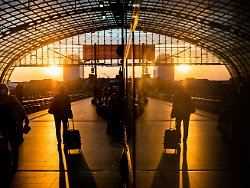Monday 23 August 2021
Travelers need strong nerves
GDL extends strike to passenger traffic
The nationwide train drivers’ strike in passenger transport by Deutsche Bahn has begun. Millions of travelers have to be prepared for massive restrictions, especially in long-distance traffic, by Wednesday morning. In addition to the train drivers, employees in the infrastructure – for example in the signal boxes – are again called on to stop their work.
The train drivers’ union GDL started its rail strike in passenger traffic in the morning and is expanding its labor dispute as announced. An exact assessment of the effects will only be possible after the start of operations in the morning, said Deutsche Bahn. Around a quarter of long-distance trains should therefore run. A train should run every two hours, especially on some of the main axes. But the offer will be distributed very differently from region to region, it said. Train cancellations and delays would become the norm.
The railway failed on Sunday when it tried to avert the strike in passenger traffic. She agreed to negotiate a corona bonus for employees, one of the GDL demands. However, the GDL saw it as a “sham offer” and stuck to the strike plans.
In freight traffic, which has been on strike since Saturday, the railway expects increasing disruptions and delays during the day. The group assumes that long-distance traffic will normalize again in the course of Wednesday. It is already the second wave of strikes in the ongoing collective bargaining conflict between Deutsche Bahn and GDL. About two weeks ago, the union paralyzed large parts of passenger traffic for two days. This time, however, the travelers had more time to prepare for the labor dispute. GDL boss Claus Weselsky had already announced the strike action on Friday. “It is not the aim of the railway workers in Germany to paralyze rail traffic,” he said. “The goal is to achieve better incomes, to protect small pensions.”
“The situation is worrying”
The wage dispute is, among other things, about more money for employees. Both sides agree on the level of future wages and salaries: there should be 3.2 percent more. But there is disagreement about the timing of the payout. There are also unanswered questions about the company pension, the amount of a possible corona premium for employees and the GDL’s sphere of influence. After all, the trade union is also concerned with its own influence in the group, which it sees as endangered by the so-called collective bargaining law.
The law provides that in a company with two competing trade unions, only the collective agreements of the employee representatives with a larger number of members apply. In the case of Deutsche Bahn companies, this is usually the larger railway and transport union (EVG). Most recently, Federal Transport Minister Andreas Scheuer had asked both sides to return to the negotiating table. “Do not destroy the good development after the long Covid lean spell with a protracted # tariff conflict! The situation is worrying,” he wrote on Twitter with a view to long-distance traffic, which is slowly recovering after the Corona crisis
.
